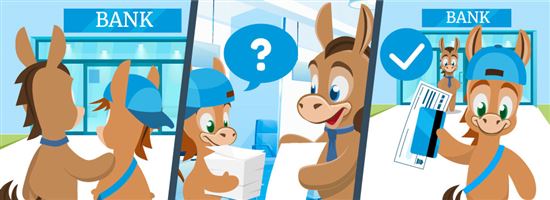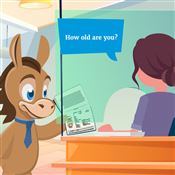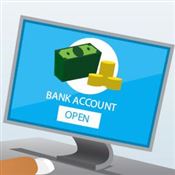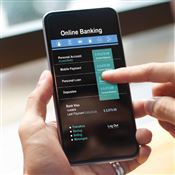What Do You Need to Open a Bank Account If You're Under 18
The earlier you get into banking, the better. But what exactly do you need to get started? Read on to find out.
 |
Opening a bank account as a minor is a great way to build on your journey in personal finance. You'll gain valuable money management skills and financial independence as you grow up.
The question is: where do you start? It can get so overwhelming, especially with so many options. Here's a quick guide to help you out.
Acorns Early Kids' Debit Card
- Real-time spend notifications.
- Block and unblock cards easily.
- Teach financial independence safely.
All Ages - Banking and Invest in One App
- Flexible controls, spending notifications, in-app chore list
- Age: No minimum age
- Fees: Starts at $5.99/month, per family (up to 5 kids). $9.98/month for Greenlight Max. $14.98 per month for Greenlight Infinity.
First Checking - 0.10% APY
- Joint checking account for 13-17 year olds
- No fees
- Up to $12 domestic ATM fee reimbursements per month
What Do You Need to Open an Under-18 Bank Account?
Depending on the bank and the type of account you plan to open, what you'll need to provide will differ. To give you a better idea, here are a few requirements they'll probably ask for:
- A cosigner
A minor must have a cosigner—an adult of legal age, preferably a legal guardian or a parent. - A photo ID of the cosigner
Examples of accepted IDs are driver's licenses, state ID cards, passports, etc. - A proof of identity for the minor
This includes any valid ID like a birth certificate. - Social Security number
Both the minor and cosigner will need to provide either a Social Security number or taxpayer identification card. - A secondary ID
Some banks may also ask for a secondary ID. Examples include a valid student ID, major credit cards, etc. - Proof of address
These include utility bills, mortgage statements, posted mail with your name and address, or documents from school (like enrollment papers or report cards). - An initial deposit
The amount you need to deposit will depend per bank, so be sure to check what they require before opening an account.
The age requirement differs based on the type of account you want to have. Custodial and savings accounts can be opened even for babies but checking accounts are commonly reserved for teenagers 13 to 17 years old.
However, there are some checking accounts that allow you to start even earlier like the Capital One MONEY Teen Checking account which allows you open an account as early as 8 years old with a parent or legal guardian.[1]
Can a Minor Open an Account on Their Own?
No. According to law, minors will need a parent or legal guardian as a cosigner to open a bank account under 18.[2] However, there are exceptions to this.
For example, Bank of America's SafeBalance Banking account lets you have sole ownership as long as you're 16 or older. Note that you'll need to apply as a student to open this account.
How to Set Up a Bank Account for a Minor
Now that you have all the documents you'll need, here's how to go about setting up a bank account as a minor:
- Identify your goals
Before you even think about opening an account, it's helpful to figure out why you're opening an account in the first place.Ask yourself: Why do you want to open an account? What will be the primary purpose of the account? What are your long-term goals for your account and your money?
- Choose the right account
The next step is to choose an account based on your goals.If you're looking to learn how to save, maybe you should consider a savings account. If you want to learn how to manage and budget your spending, a checking account might be a better fit. If you need easy access to your cash, try a debit card for teens.
It's important to remember that you're just starting out. Choosing the right type of account to start with will help you in the long run.
- Prepare all the requirements
Because you're opening a bank account as a minor, banks will require a lot of documents from you and your parent/guardian. To make the process as smooth as possible, make sure to prepare all the requirements beforehand.After your application, the bank will present you with your account's terms and conditions. Look out for fees and penalties and be sure to take note. Read it thoroughly before signing and make sure you don't sign into anything you don't agree with. - Apply online or in-person
Many banks will allow you to apply for an account both online and in-person. However, it'll mostly depend on the bank. Some of the more traditional ones will still require you to head to the nearest branch with your parent or guardian to apply in-person.Can you open a bank account for minors online?
Yes, many banks will allow you to open an account for your child through their website or app. Just make sure you have all the documents ready before applying. - Fund the account
The final step is to put money into the account. There are multiple ways to do so, including via fund transfers and direct deposit.Depending on the type of account, your deposit could take a few hours up to a couple of days to reflect.
How much money do you need to open a bank account?
It doesn't take a lot to open a bank account. Initial deposits commonly range from $0 to $25.
Types of Accounts for Minors
With all the options available, choosing a type of account can understandably get overwhelming. Here are some of the more common types:
- Checking account
Checking accounts are for day-to-day expenses and usually come with a debit card. With these, you can make purchases and transfer money instantly. - Savings account
A savings account allows you to save and grow your money with interest. Unlike teen checking accounts, savings accounts can be opened for much younger children.What happens to the account when the child turns 18?
For savings and checking accounts, they are usually converted to standard accounts. Terms and conditions may vary across banks, so it's best to check in with them first. You may be required to sign additional documents upon the conversion of your account. - Debit cards for kids
Instead of going through a traditional bank, there are many digital banks from fintech companies that can provide debit cards for kids.These mobile apps promote financial responsibility through in-app features. These include receiving funds from your parents after completing chores, the ability to request funds directly from your cosigner's bank account, and more.
Some debit cards will charge monthly service fees. To get an idea of which cards will best suit you, check out our article about the best debit cards for kids. - Prepaid cards
Unlike debit cards, prepaid cards aren't connected to bank accounts. Instead, your parent or guardian loads money onto the card, allowing you to spend it freely. - Custodial account
Custodial accounts are best for planning your future. Unlike savings accounts, you'll only have access to the account once you reach the legal age.This type of account isn't ideal if you want to learn how to save money wisely, but it'll provide great security for your future.
Acorns Early Kids' Debit Card
- Real-time spend notifications.
- Block and unblock cards easily.
- Teach financial independence safely.
All Ages - Banking and Invest in One App
- Flexible controls, spending notifications, in-app chore list
- Age: No minimum age
- Fees: Starts at $5.99/month, per family (up to 5 kids). $9.98/month for Greenlight Max. $14.98 per month for Greenlight Infinity.
First Checking - 0.10% APY
- Joint checking account for 13-17 year olds
- No fees
- Up to $12 domestic ATM fee reimbursements per month
What to Consider when Choosing an Account
As with any of the types of accounts mentioned above, there are specific things you'll need to consider before opening one. Here are a few you should be taking into consideration:
- Fees
Not all banking services are free. Some of them come with monthly maintenance fees, depending on the type of account. Many accounts for kids will be free, so those would be ideal for someone just starting out. - Your age
Different accounts have varying minimum age requirements. Checking accounts are common for teens, while savings are open for much younger children.A study suggests that the best time to teach a child how to save is at 9 years old. At 10, they'll be able to understand how cards work. Teaching them about purchases is best started at 12. - Financial literacy features
Almost all bank accounts these days have corresponding mobile apps. Many accounts designed for children will have educational features built into the app. So if you want to learn more about personal finance, make sure if the materials available will help you learn as you bank. - FDIC or NCUA Insured
For the most security over your money, make sure that your chosen bank or credit union is FDIC or NCUA insured. This protects you (up to $250,000) in case your bank ever declares bankruptcy.[3][4]Most banks and credit unions are insured, but be sure to double check before opening an account.
Acorns Early Kids' Debit Card
- Real-time spend notifications.
- Block and unblock cards easily.
- Teach financial independence safely.
All Ages - Banking and Invest in One App
- Flexible controls, spending notifications, in-app chore list
- Age: No minimum age
- Fees: Starts at $5.99/month, per family (up to 5 kids). $9.98/month for Greenlight Max. $14.98 per month for Greenlight Infinity.
First Checking - 0.10% APY
- Joint checking account for 13-17 year olds
- No fees
- Up to $12 domestic ATM fee reimbursements per month
Why You Should Open an Account as a Minor
According to a study done by the Federal Reserve, 2 out of 3 young adults lack basic financial literacy. [5] Here are a few reasons why opening an account as a minor is important:
- It promotes financial literacy
Because of the educational materials found in a lot of banking apps, financial literacy is now easily within reach at any age. By exposing these concepts to yourself at an early age, you can make more sound financial decisions as you grow older.Building good payment habits early can also help you increase your creditworthiness. By starting early, you can build on it as you age and really make the most out of it by the time you need it.
- It builds financial independence
By learning while you bank, you'll be able to learn about finances at a pace you're comfortable with. Your self-trust develops by making decisions with your own money and account.Having savings also makes you less reliant on your parents and gives you the ability to pay for your own bills without having to ask for help.
- It develops a stronger sense of trust in financial institutions
A recent study by NORC at the University of Chicago revealed that only 10% of Americans have great trust in banking institutions.[6] None of these institutions are perfect by any means, but a lack of trust can pose problems in the future.A child's first-time experience with banking can either make or break their view of the institution as a whole. With guidance from both the bank and the parents, a child can have a smooth experience and gain more overall trust for the system.
Set Your Goals: How Much Should You Save?
If you have financial goals you want to achieve, use this calculator to know how much you need to save per month to reach your target.
Bottom Line
Financial literacy and independence is essential in any growing economy. The earlier you can learn how money works, the better.
One of the best ways to ensure that you make sound financial decisions is by introducing yourself to the concept of banking early. It gives you a safer environment to make mistakes and learn from them.
References
- ^ Capital One MONEY Teen Checking, Retrieved 9/18/23
- ^ Office of the Comptroller of the Currency. Guidance to Encourage Financial Institutions' Youth Savings Programs and Address Related FAQ, Retrieved 9/6/2023
- ^ FDIC. Your Insured Deposits, Retrieved 9/6/2023
- ^ NCUA. How Your Accounts are Federally Insured, Retrieved 9/6/2023
- ^ Federal Reserve. Does Access to Bank Accounts as a Minor Improve Financial Capability? Evidence from Minor Bank Account Laws, Retrieved 08/15/2023
- ^ Associated Press-NORC Center for Public Affairs Research. Few have confidence in financial institutions, Retrieved 08/15/2023
Write to Andi Geronimo at feedback@creditdonkey.com. Follow us on Twitter and Facebook for our latest posts.
Note: This website is made possible through financial relationships with some of the products and services mentioned on this site. We may receive compensation if you shop through links in our content. You do not have to use our links, but you help support CreditDonkey if you do.
|
|
|







